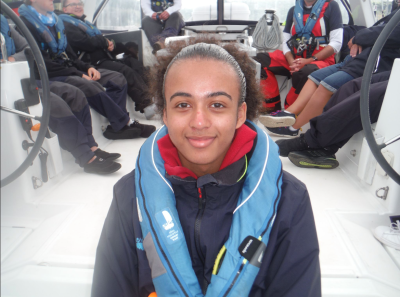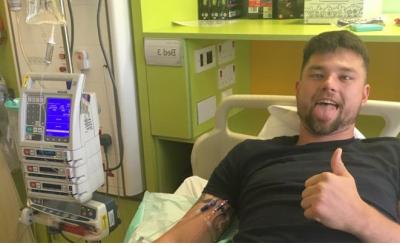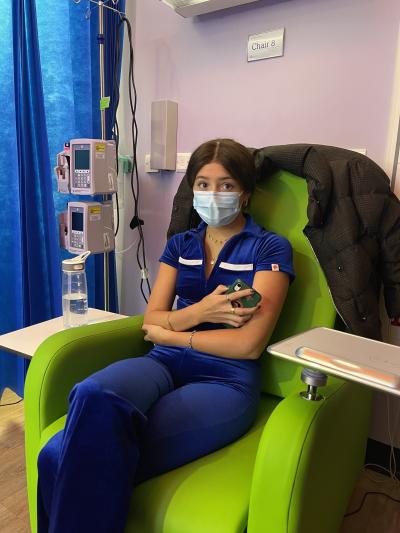What to say to someone with cancer: Young people's tips
It can be really hard to know what to say to someone with cancer in a text, in a card, or face-to-face. Here, young people who’ve been through cancer themselves share their tips on what to say and what not to say to someone with cancer.
Do's
1. Chat to us about normal things - we’re still the same person.
Sophie: It is important to remember that despite their diagnosis, people with cancer are still the person they were before! They have the same hobbies and interests, same likes and dislikes. Talk to them about the ‘normal’ stuff not just cancer, give them a distraction.
Callum: When you get a diagnosis like that it can go two ways with friends. They can see you in a different light, and only see the cancer and see the illness within you, or they can be supportive. I said to my friends: ‘No, we are not going to cry about it, we are going to act as if everything is ok. You are going to treat me exactly the same’. They did, and at times I hated them for it. But it was a great help as it made me feel normal and like I was still me. That was the biggest part for me, taking that control.
2. Ask us if we want to talk about it
Katie: Sometimes I wanted to describe how distressing it was when the nurses couldn’t find a vein at my last chemo appointment, how I didn’t want to go back, or how low I felt days later lying in bed with chemo-induced nerve pain. Sometimes I wanted someone to listen, and understand me. Sometimes I wanted nothing more than to forget about cancer and have a good time talking about silly things, playing games or watching movies. It felt relieving when friends gave me space to express how I was really feeling, when I needed to, on my own terms.
3. Keep inviting us to social events
Sophie: If you have a friend with cancer, remember an invite goes a long way. Even if they decline, still being invited to things gives them the choice to come along and lets them know they are still involved. Don’t assume their decline means they don’t want to come, many times while I was poorly, I really wanted to hang out with friends, but my body wouldn’t let me, I would be too tired or feel sick. However, at times when I felt less unwell, I was able to enjoy time with people who made me happy.
Harvey: This is an anxiety free way of showing you’re still thinking of me and I’m involved - ‘Here is an invite to XXXX no pressure at all and we understand you might not make it, but we would love to have you there.’
4. Send messages to say you’re thinking of us with no need to reply.
Harvey: No need to reply but I’m thinking of you, is a great ice breaker if you want to talk and still a great mood booster if you don’t.
5. Just say if you don’t know what to say.
Jordan: It was helpful when people were honest and would say ‘I don’t know what to say.’
Don'ts
1. Ask us if we’re going to die / tell us about your dog / cousin’s neighbour or relative that died of cancer
Chloe: Some people were really brash. I was quite open and told people about my diagnosis. When I was first diagnosed, some people asked if I was going to die. When I told people it was stage 4, I also got: ‘Does that mean it’s terminal?’ They could have phrased it so much better and just asked what stage 4 meant for me. It was an awkward thing to have to explain.
Maddy: One person said: ‘How long do you have left?’ Others were so desperate to relate that they told me their dog had died of cancer, or their granny, or their cousin’s neighbour.
2. Comment about how we look
Amy: One thing that was said to me and was quite personally upsetting was ”Is that a wig?” Or “Has your own hair grown back yet?” For most people going though treatment losing hair is an extremely distressing side effect. I have even experienced people saying “Take your wig off and let us see what length your real hair is!” My advice would be, just don’t mention it unless the person wearing a wig mentions it to you. It’s hard enough dealing with having no control of what side effects your treatment may be causing without having to worry about the extra pressure of your appearance.
3. Speculate about why we got cancer
Sophie: There is little known about the cause of childhood cancer so don’t assume there is a reason your friend has been diagnosed.
At the start of my diagnosis a friend made a comment about palm oil, saying that I got cancer because had previously eaten Nutella. Looking back, it seems absurd and it came from a lack of understanding, they didn’t know that childhood cancers are very rarely lifestyle induced. Refrain from making comments about the cause of other people’s cancer as it can be hurtful.
Another occasion where someone assumed the cause of my cancer was quite recently, a peer at school said that I got cancer because I didn’t believe in God. I found this comment very difficult to interpret as I felt blamed for something out of my control. Everyone has different beliefs and are entitled to them however, it is not always appropriate to share insensitive views similar to this. Make sure that you are educated before speaking about someone’s cancer, like I said before, if you don’t know just ask.
4. Tell us we’re brave
Katie: Language that centred on bravery made me feel isolated. Those comments seemed like projections of what people wanted for me - a way to dress my circumstances up nicely and make them more palatable - rather than connecting with how I really felt.
Cancer isn’t a battle, it’s an illness that requires immediate treatment. I didn’t need motivation in order to force myself through it, and I didn’t feel like celebrating myself for making the obvious decision to get treatment. I couldn’t view that as impressive at the time, and I didn’t find it helpful when people told me I was doing something impressive.
“Cancer warrior” was once a metaphor survivors used to describe experiences they couldn’t describe in any other way. Now, the public as a whole have become so familiar with the metaphor that we no longer distinguish it from patients’ realities. I don’t want my condition to be reduced to something you see branded on mugs and t-shirts.
5. Say nothing at all
Sophie: It is difficult to support someone through cancer but sharing your love, time, kindness, and generosity will make your friends treatment much more bearable. Reminding your friend that you are there to support them will make a huge difference. Texts, phone calls, cards and offering your company, are all gestures that ensure your friend won’t go through cancer alone.




